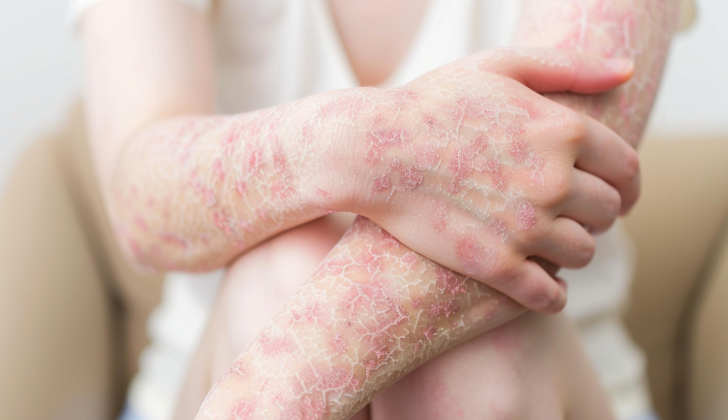World Psoriasis Day, observed every year on October 29th, is a global event dedicated to raising awareness about psoriasis and psoriatic arthritis, advocating for better healthcare access, and offering support to the millions of people affected by these chronic, non-contagious autoimmune diseases. Organized by the International Federation of Psoriasis Associations (IFPA) and supported by various global partners, this day serves as a platform to educate, empower, and inspire both individuals living with the condition and the broader public.
Understanding Psoriasis
What is Psoriasis?
Psoriasis is a chronic autoimmune skin disorder that causes skin cells to multiply up to 10 times faster than normal. This leads to a build-up of skin cells on the surface, forming red, scaly patches, which may be itchy, painful, and unsightly. It is not contagious but has a significant impact on quality of life.
Types of Psoriasis
There are several forms of psoriasis, each with unique characteristics:
- Plaque Psoriasis (Psoriasis Vulgaris) – The most common type, characterized by raised, inflamed red patches covered with silvery-white scales.
- Guttate Psoriasis – Small, drop-shaped lesions, often triggered by bacterial infections like strep throat.
- Inverse Psoriasis – Smooth, shiny red patches in body folds such as the armpits, groin, or under the breasts.
- Pustular Psoriasis – White pustules surrounded by red skin, usually found on the hands or feet.
- Erythrodermic Psoriasis – A rare, severe form that causes widespread redness, scaling, and extreme discomfort.
What is Psoriatic Arthritis?
About 30% of individuals with psoriasis develop psoriatic arthritis, a form of inflammatory arthritis that affects the joints and tendons. It can lead to joint damage if left untreated.
Causes and Risk Factors
The exact cause of psoriasis is not fully understood, but it’s believed to involve a combination of genetic, immune, and environmental factors.
Genetic Factors
- Psoriasis often runs in families, indicating a genetic predisposition.
Immune System
- Psoriasis is an autoimmune condition where the immune system attacks healthy skin cells, triggering rapid cell growth.
Triggers and Environmental Factors
- Stress
- Infections (e.g., streptococcal throat infection)
- Skin injuries (cuts, burns, bug bites)
- Certain medications (e.g., lithium, beta-blockers)
- Alcohol and smoking
- Cold, dry weather
Symptoms and Diagnosis
Common Symptoms
- Raised, red patches of skin with silvery scales
- Dry, cracked skin that may bleed
- Itching, burning, or soreness
- Thickened, pitted, or ridged nails
- Stiff or swollen joints (in cases of psoriatic arthritis)
Diagnosis
Psoriasis is typically diagnosed based on:
- Clinical examination of the skin, nails, and scalp
- Medical history and family background
- Skin biopsy in uncertain cases to confirm the diagnosis
Impact on Quality of Life
Psoriasis can significantly affect a person’s physical, emotional, and social well-being. It can lead to:
- Depression and anxiety
- Social stigma and isolation
- Reduced self-esteem
- Physical discomfort and fatigue
- Work and relationship challenges
Many individuals report feeling embarrassed or ashamed, often avoiding social interactions or certain activities due to visible symptoms.
Treatment and Management
While there is no cure for psoriasis, various treatments can help manage symptoms effectively.
Topical Treatments
- Corticosteroids
- Vitamin D analogs
- Coal tar
- Moisturizers and emollients
Phototherapy
- Ultraviolet B (UVB) therapy
- PUVA (Psoralen + UVA) therapy
Systemic Medications
- Oral or injected medications for severe cases:
- Methotrexate
- Cyclosporine
- Acitretin
Biologic Therapies
- Targeted drugs that block specific immune system pathways:
- TNF-alpha inhibitors (e.g., adalimumab)
- IL-17, IL-23, and IL-12 inhibitors
Lifestyle Management
- Maintaining a healthy diet
- Regular exercise
- Stress reduction techniques
- Avoiding triggers (e.g., smoking, alcohol)
The Significance of World Psoriasis Day
World Psoriasis Day was established to:
- Raise Awareness – Combat myths and misinformation surrounding psoriasis and psoriatic arthritis.
- Advocate for Access to Treatment – Highlight disparities in healthcare access and call for affordable treatment options.
- Foster Education – Educate patients, families, healthcare providers, and policymakers.
- Support the Community – Empower individuals with tools, knowledge, and emotional support.
- Promote Research – Encourage investment in research for better treatments and a potential cure.
Each year, the IFPA selects a theme to focus global efforts. Past themes have included “Psoriasis Inside Out,” “Unite for Action,” and “Let’s Get CONNECTED.” These themes emphasize the importance of unity, visibility, and shared advocacy.
Advocacy and Global Impact
World Psoriasis Day has led to tangible changes around the world:
- Increased inclusion of psoriasis in national health policies
- Better insurance coverage for treatments
- Greater public understanding and empathy
- Formation of support networks and community outreach initiatives
Global organizations, like the World Health Organization (WHO), have recognized psoriasis as a serious non-communicable disease, elevating its profile and urging governments to take action.
How You Can Participate
- Spread Awareness Online – Share educational materials, personal stories, and support resources using hashtags like #WorldPsoriasisDay.
- Host or Attend Events – Participate in webinars, awareness walks, and community meetups.
- Support Psoriasis Organizations – Donate or volunteer with groups like the National Psoriasis Foundation.
- Educate Others – Speak at schools, workplaces, and healthcare settings.
- Advocate for Policy Change – Contact lawmakers to support better healthcare access and research funding.
Conclusion
World Psoriasis Day is more than just a date on the calendar—it’s a movement to empower those affected by psoriasis, advocate for improved healthcare access, and raise global consciousness. Through awareness, education, and community involvement, we can reduce stigma, improve care, and help individuals live full and confident lives.
By participating in World Psoriasis Day and supporting those with psoriasis and psoriatic arthritis, we all play a role in creating a more inclusive and informed society. Let October 29th be a day of visibility, advocacy, and hope for millions around the world.












